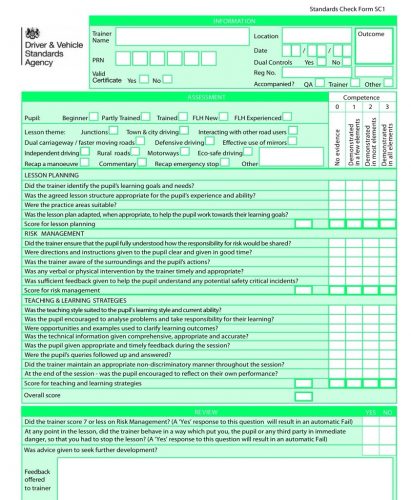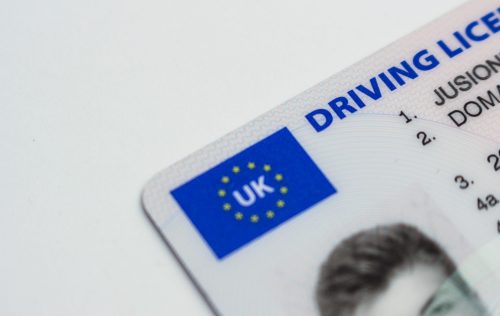DSA Check Test Training
Posted in: Driving Courses, Driving Instructor Training.
Before you take you check test at least take some training from one of our friendly ADI’s who have passed the check test
My advice is don’t leave it a moment too long, that grade 4, 5 or 6 is vitally important to your income, as many ADI’s fail, and then put under pressure for their next check test
The below notes detail exactly what the DSA SE is looking for in your Check test
These notes deal with the conduct of inspections of an instructor’s work after they have been registered. These are known as ‘check-tests’, but in the Road Traffic Act and the Motor Cars (Driving Instruction) Regulations, are formally described as ‘tests of continued ability and fitness to give instruction in the driving of motor cars’. This description explains what the test is all about, i.e. to establish that the ADI retains and displays the competence to give instruction, which they demonstrated when they qualified for registration.
The Regulations state that the candidate (ADI) shall be assessed on their instructional ability, and, in particular, in respect of the following qualities: –
- Method, clarity, adequacy and correctness of instruction (compliance with the core competencies.)
- Observation and proper correction of the pupil’s errors
- Manner, patience and tact in dealing with the pupil and
- Ability to inspire confidence.
These periodic check tests on instructors do more than ensure that standards do not slip. They also provide the opportunity for supervising examiners to give advice and guidance on the way in which instruction can be improved and are seen as part of their ‘continued development’. This is a positive function of the SE (ADI)’s&(SDE/DE’s) job, and can pay dividends. Instructors in general welcome the opportunity of contact with someone who can give them authoritative advice on driving or instructional methods and they are appreciative of the interest that is taken in their problems. As discussion usually leads to instructors being better informed, and therefore better able to do their work well, this activity helps to fulfil the Agency’s objective to improve the quality of instructional standards.
Examiners conducting check tests should liaise regularly with the SE ADI and check test booking office (Newcastle or Cardiff) to ensure their programmes of check tests are arranged so as to achieve maximum productivity in the time available. Examiners conducting check tests need to give check test booking centres at least six weeks notice of their availability. Check test booking centres should select those ADI’s that are on the priority list ‘P’ however SE’s ADI need to take ownership and monitor who has been booked to ensure efficiency and every endeavour should be made to keep costs (T&S) to a minimum.
Check tests on ADI’s should be made at the intervals relevant to their present grading and in priority order. You will appreciate that there is less point in conducting check tests on the best ADI’s compared with those who are not quite as good. When compiling a programme of work, examiners should work closely with their booking clerk in striking a balance between the ones that should be seen and the ones that need to be seen ensuring that SDE’s & DE’s who conduct check tests target those who need to be seen, bearing in mind that their objectives must be to maintain progress on the priority list and to use their time so that it will be most effective in raising the standard of instruction while avoiding the risk of any ADI complaining that they are being neglected.
The examiner will see the ADI at work, giving driving instruction to a pupil. This instruction must be a normal on road lesson given to beginner or partly trained pupil; advanced tuition or Pass Plus. In all cases the standard to be applied in assessing the ADI’s performance is equivalent to that used in Test 3 of the practical test for entry to the Register.
Examiners ADI should normally conduct a check test on every routine visit he makes to an ADI. If the ADI cannot present a lesson because of illness of the pupil or late cancellation, then the examiner (ADI) can carry out a role-play check test.
Upon receipt of the ADI Check Test Journal the examiner should check to see if any of the ADI’s listed has requested a ‘role-play’ check test. This will be marked on the journal. If so, the examiner should contact the named ADI to inform them of the proposed subject matter so that they can prepare. It is also important that the examiner confirms with the ADI that they are familiar with the area where the check test is scheduled to take place. If the answer is no the ADI should be advised to plan and prepare so that the chosen area is suitable for the subject matter.
The examiner should choose from the following list of lesson plans: –
- 1. A Remedial lesson (The ADI would be given a completed DL 25A)
- 2. Junctions (then specify emerging, crossroads, roundabouts)
- 3. Mirrors and a manoeuvre (not more than 25 minutes spent on the manoeuvre which may, if necessary, be split into two parts)
- 4. A Pass Plus Module (provided the ADI is Pass Plus registered)
- 5. Dual carriageway/Open roads
- 6. A general driving lesson which would include some of the following: Meet/Cross/Overtake/Alertness & Anticipation and Pedestrian Crossings
- 7. Mirrors (MSM) and Pedestrian Crossings
- 8. A disqualified driver needing to take an extended driving test
- 9. An Advanced/Fleet driver lesson (Full licence holder, perhaps a motorway lesson).
Examiners should take into account that an ADI will need to take a few minutes to assess the ‘pupil’s’ ability, whilst at the same time keeping the car safe.
At the end of the ‘lesson’ the examiner should ask the ADI to wait in a convenient place, retire to the office and complete the CT/26 (but not the grade). The
Tags: adi check test, check test, check test basingstoke, check test bracknell, check test grade 6, check test guildford, check test reading, check test rescue, check test training, check test woking, dsa check test

















